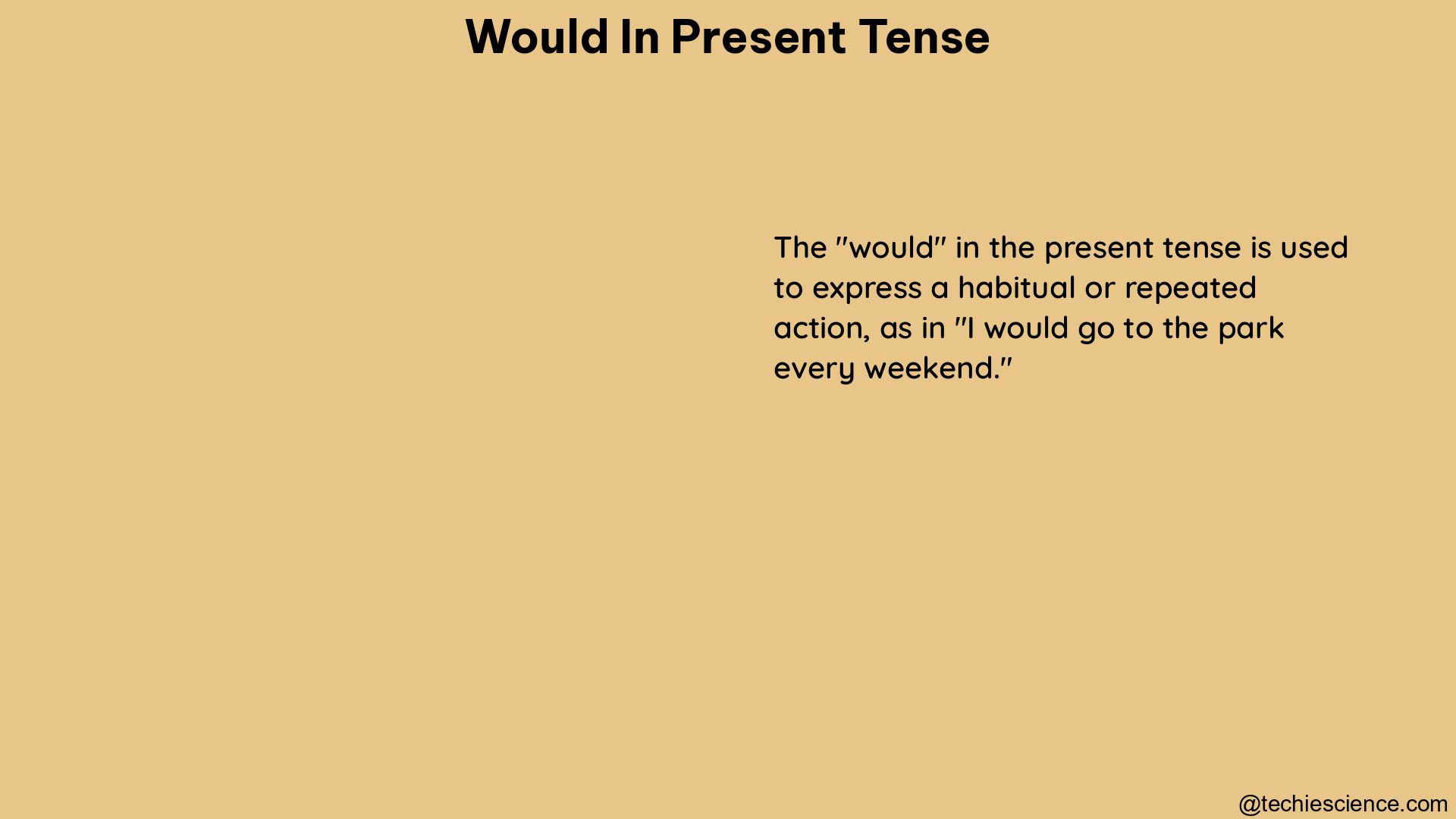The use of “would” in the present tense is a complex and nuanced topic in English grammar. It is an auxiliary verb that can express various meanings, from polite requests to hypothetical situations. Understanding the proper usage of “would” in the present tense is crucial for effective communication and writing.
Polite Requests and Offers
One of the primary uses of “would” in the present tense is to make requests and offers more polite. This is particularly useful in formal or professional settings, where a more courteous tone is expected.
Examples:
– “Would you like some coleslaw?” (Do you want some coleslaw?)
– “Would you turn in your assignment now?” (Please turn in your assignment now.)
– “Would you mind helping me with this task?” (Could you please help me with this task?)
In these cases, “would” softens the request and makes it sound less demanding, conveying a sense of politeness and consideration for the other person.
Hypothetical Situations

“Would” can also be used in the present tense to describe hypothetical or imaginary situations. These statements do not reflect reality but rather explore possibilities or speculate about potential outcomes.
Examples:
– “It would be very expensive to stay in a hotel.” (Imagining a situation where staying in a hotel is expensive)
– “If I won the lottery, I would buy a house.” (Hypothetical situation of winning the lottery and buying a house)
– “If we had left earlier, we would have been able to stop off for a coffee on the way.” (Imagining a past situation and its consequences)
In these cases, “would” helps to create a sense of uncertainty or conditionality, allowing the speaker to explore alternative scenarios without making definitive statements.
Expressing Preferences
The use of “would” in the present tense can also be employed to express personal preferences or desires. This usage often indicates a stronger inclination or a more definitive choice.
Examples:
– “I would rather die than face them.” (I prefer death over facing them)
– “I would prefer to take the train instead of driving.” (I have a stronger preference for taking the train)
– “You would enjoy this book if you gave it a chance.” (Suggesting the person would likely enjoy the book)
In these instances, “would” conveys a sense of personal preference or recommendation, guiding the listener or reader towards a particular choice or outcome.
Giving Advice
Another common use of “would” in the present tense is to provide advice or suggestions for hypothetical situations. This usage often involves speculating about potential outcomes or recommending a course of action.
Examples:
– “You would lose weight if you took more exercise.” (Advice for a hypothetical situation)
– “If you studied harder, you would get better grades.” (Advice for a hypothetical situation)
– “I would suggest taking a different route to avoid the traffic.” (Advice for a hypothetical situation)
In these cases, “would” helps to frame the advice as a hypothetical scenario, allowing the speaker to provide guidance without making a definitive statement.
Expressing Uncertainty or Doubt
In some instances, “would” can be used in the present tense to express uncertainty or doubt about a particular situation or outcome.
Examples:
– “I would think that’s the right answer.” (Expressing uncertainty about the answer)
– “Would you know where I can find a good Italian restaurant?” (Expressing uncertainty about the location of a restaurant)
– “I would imagine the weather will be nice tomorrow.” (Expressing uncertainty about the weather forecast)
In these cases, “would” softens the statement and conveys a sense of hesitation or lack of certainty, allowing the speaker to express their thoughts or beliefs without making a definitive claim.
Theoretical Explanation
The use of “would” in the present tense is a complex topic because it is a modal verb that can be used to express various degrees of possibility, obligation, or preference. It can be used in different tenses (past, present, future) and moods (indicative, conditional) to convey different meanings.
The key to understanding the use of “would” in the present tense is to consider the context and the intended meaning. “Would” can be used to make statements more polite, hypothetical, or uncertain, depending on the specific situation and the desired effect.
By mastering the nuanced usage of “would” in the present tense, English language learners and writers can enhance their communication skills, express their thoughts and preferences more effectively, and navigate various conversational and written scenarios with greater precision.
References
- https://www.butte.edu/departments/cas/tipsheets/grammar/would.html
- https://learnenglish.britishcouncil.org/grammar/english-grammar-reference/will-would
- https://dictionary.cambridge.org/us/grammar/british-grammar/would

Hi…. I am Goutam Datta. I have completed a double M. A. in English and B. Ed. I am a creative writer. Currently, I am a part of the LambdaGeeks.